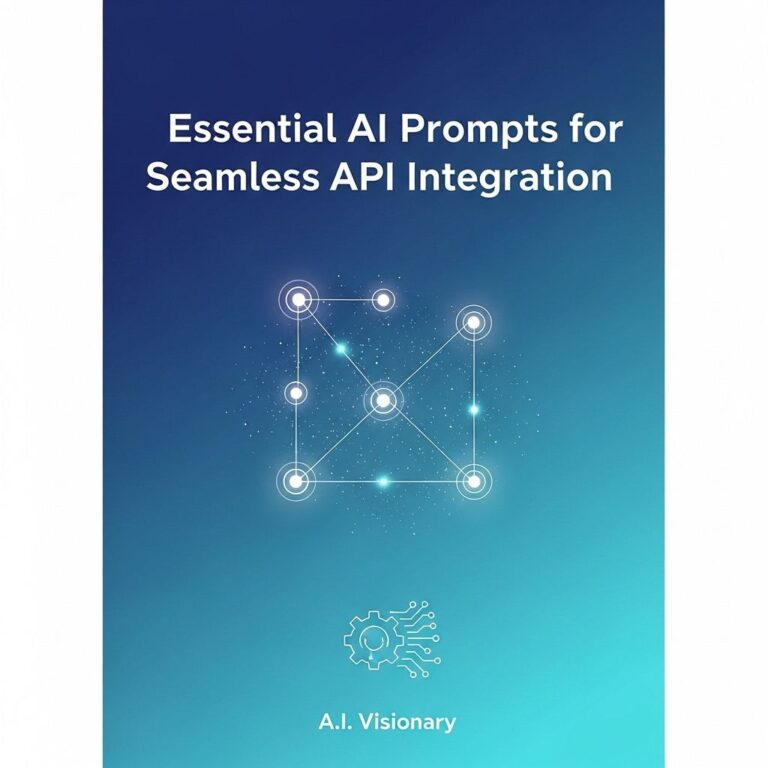As we rapidly advance into a new era of technology, the capabilities of artificial intelligence (AI) are expanding at an unprecedented rate. By 2025, automation driven by AI will revolutionize industries, streamline operations, and enhance productivity. Understanding the innovative prompts that can uncork the full potential of AI in automation is critical for tech-savvy individuals who want to stay ahead in their fields. This article delves into the cutting-edge prompts and strategies that can be employed to harness AI’s power effectively.
Table of Contents
The Evolution of AI in Automation
Initially, automation through AI focused on repetitive tasks, but the technology has evolved to handle increasingly complex operations. Here are some key milestones in this evolution:
- Machine Learning Integration: AI systems can now learn from data and improve their performance over time.
- Natural Language Processing (NLP): AI can understand and respond to human language, facilitating smoother interactions.
- Predictive Analytics: AI can analyze data trends to predict future outcomes, enabling proactive decision-making.
- Robotic Process Automation (RPA): AI can now automate entire workflows, replacing manual processes with automated systems.
Innovative AI Prompts for Automation
To maximize the benefits of AI in automation, it is essential to consider various prompts that can guide AI systems in performing tasks efficiently. Below are some innovative AI prompts that can be utilized across different sectors:
1. Customer Service Automation
AI chatbot systems have transformed customer service by providing instant responses and support 24/7. Consider these prompts to enhance your chatbot capabilities:
- “Analyze customer interactions and suggest improvements for response times.”
- “Create a knowledge base from customer FAQs and automatically update it with new queries.”
- “Identify sentiment in customer messages to tailor responses accordingly.”
2. Data Management
For organizations inundated with data, AI can help streamline data management processes. Here are some prompts to consider:
- “Extract key insights from our quarterly reports and present them in a concise dashboard.”
- “Automate data entry and validation processes to minimize human error.”
- “Provide anomaly detection alerts for unusual data patterns.”
3. Marketing and Sales Automation
AI can drive marketing strategies and sales processes effectively. Utilize these prompts to enhance your marketing efforts:
| Prompt | Benefit |
|---|---|
| “Generate personalized email campaigns based on customer behavior.” | Enhanced engagement and conversion rates. |
| “Analyze competitor marketing strategies and suggest improvements.” | Informed decision-making for marketing initiatives. |
| “Forecast sales trends for the upcoming quarter based on historical data.” | Better inventory management and sales strategies. |
4. Human Resource Management
AI can automate various HR functions, making the hiring and management processes more efficient. Consider these prompts:
- “Screen resumes and rank candidates based on predefined criteria.”
- “Automate onboarding processes to enhance new employee experience.”
- “Identify employee satisfaction trends through pulse surveys.”
Combining AI Prompts for Maximum Impact
Integrating multiple AI prompts can create a more robust automation system. Here’s how you can combine different prompts for optimal results:
Cross-Functional Automation
Employing AI prompts across departments can ensure consistency and efficiency. For example:
- In marketing, use AI to analyze customer data and feed insights into sales strategies.
- Combine HR data with customer service feedback to improve employee training programs.
- Integrate financial data analysis with marketing forecasts for budget optimization.
Challenges to Consider
While the potential for AI in automation is vast, certain challenges must be addressed to fully leverage these technologies:
- Data Privacy: Protecting sensitive customer data is paramount in any automated system.
- Bias in AI: Ensuring that AI systems are free from biases is critical to maintaining fairness.
- Integration with Existing Systems: Smooth integration with legacy systems can be a technical hurdle.
The Future of AI in Automation
Looking ahead, the future of AI in automation appears promising. Innovations such as:
- AI-driven decision-making tools that provide real-time insights
- Increased personalization in customer interactions
- Enhanced predictive models for better forecasting
- Greater collaboration between humans and AI systems
These advancements will reshape how businesses operate and interact with customers. Embracing AI-led automation strategies will be crucial for organizations seeking to thrive in this dynamic environment.
Conclusion
The journey into the future of automation through AI is filled with possibilities. By understanding and implementing innovative AI prompts, organizations can not only improve efficiency but also enhance the overall quality of service and engagement. As we move toward 2025, the ability to adapt and integrate these cutting-edge strategies will be vital for success in the tech landscape.
FAQ
What are AI prompts and how do they enhance automation?
AI prompts are predefined instructions or queries that guide AI systems to perform specific tasks, enhancing automation by streamlining processes and increasing efficiency.
How will AI prompts evolve by 2025?
By 2025, AI prompts are expected to become more intuitive and context-aware, allowing for more complex interactions and enabling systems to adapt to user needs in real-time.
What industries will benefit the most from AI prompts in automation?
Industries such as manufacturing, healthcare, and customer service are poised to benefit significantly from AI prompts in automation, improving productivity and operational efficiency.
Can AI prompts be customized for specific business needs?
Yes, AI prompts can be tailored to meet specific business requirements, allowing organizations to create automated workflows that align with their unique processes and goals.
What are the challenges of implementing AI prompts in automation?
Challenges include ensuring data quality, integrating with existing systems, and addressing security and privacy concerns, which need to be managed for successful implementation.
How can businesses prepare for the use of AI prompts by 2025?
Businesses can prepare by investing in AI training, understanding their automation needs, and developing a strategic plan for integrating AI technologies into their operations.









